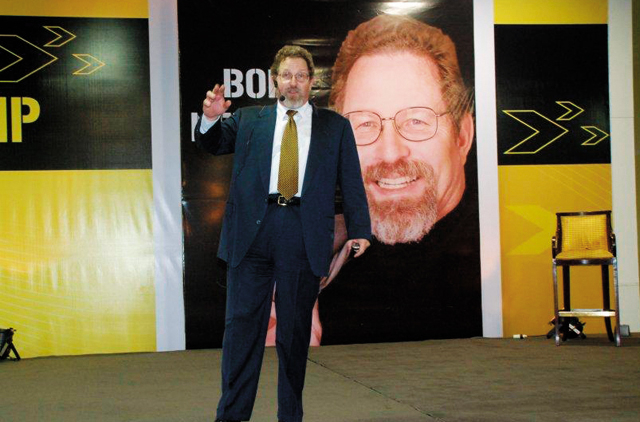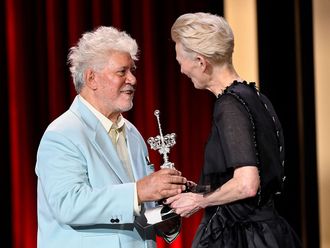
Employees at the Walt Disney World theme park in Florida, United States, are rewarded with a chocolate or an extra five minutes on their next break if they address a guest by his or her name. They also get a paid sabbatical after seven years to learn new skills. The Walt Disney Company - the park's parent company - has over 200 recognition programmes. Stew Leonard's Dairy in Connecticut has dozens of recognition activities. One is called ‘The Name Game' where every customer who is thanked by a cashier can put that cashier's name in a box. Once a week the box is opened and the top three employees with the most ‘votes' receive $30 (Dh110) each. Apple Computer has a kazoo band it brings out for spontaneous celebrations and Zappo's online retailer also uses spontaneous celebrations to mark milestones.
Why are these companies doing this? Because Dr Bob Nelson has advised them to. The best-selling author of 1001 Ways to Reward Employees and many other books - Ubuntu, written with Stephen Lundia, is his latest - has established himself as the rewards king in a field packed with hundreds of motivational speakers and writers who all talk fairly the same language. He claims to have won over four-fifths of the Fortune 500 companies to his philosophy on how to motivate employees. 1001 Ways to Reward Employees, which sold over 1.5 million copies and is now in its second edition, propelled Nelson into the spotlight. Speaking engagements took over his life, and in 1998 he started his own company, Nelson Motivation.
"My content is research-based," he explains. "I've conducted the only PhD study on the topic of non-monetary recognition, which I did with the late great Peter F Drucker; I link recognition/reward strategies to performance and the organisation's ‘bottom line'; and I provide practical techniques that can be immediately applied by anyone who listens to my presentations."
Nelson's basic premise is that while money is important to employees, appreciation shown through other means motivates them to perform even better.
"It is based on my research of 55 potential motivators - appreciation in the form of specific behaviours that employees find most motivating - for today's employees," says Nelson. "The items that were the top motivators were: a sincere, personal thanks; being asked for one's opinion and ideas and being allowed to pursue those ideas; being involved in decision-making, especially when it affects one's job; being supported by one's manager when one makes a mistake; and being given a chance to participate in development and learning activities."
Nelson, a 54-year-old father of two, is so passionate about his work he incorporates it into his personal life. At home, he and his wife, Jennifer, use his rewards philosophy in raising their children.
Finding his own motivation
Nelson started working in human resources and writing books straight after college. His undergraduate degree was in psychology, political science and communication from a liberal arts college, while his MBA was in organisational behaviour from UC Berkeley and his PhD was in management from the Peter F Drucker Graduate Management Center at Claremont Graduate University in Los Angeles. "My entire work experience has been in human resources, which I first got into with an internship in college. I worked first in several corporations [banking and computers] and then spent ten years working with Dr Ken Blanchard, the co-author of The One Minute Manager, as his chief of staff, vice president and ghost writer, helping him write seven books," he says.
Since starting his own company 14 years ago, Nelson's worked with over 1,000 organisations and four-fifths of the Fortune 500, has given presentations on seven continents and written26 books, which have been translated into over 30 languages. He was only 25 when he wrote his first book.
"I first got the idea for 1001 Ways to Reward Employees in a graduate school class when my professor - who I credit in the book - was discussing positive reinforcement theory and made the comment that although it was one of the most proven principles of management, there really had not been that much of an application of the principle in business. I remember thinking I'd like to do something about that!"
When Nelson got home late that same evening, he wrote a letter to the CEO of a New York City publisher he admired, Peter Workman, founder of Workman Publishing. "I spent two weeks trying to get him on the phone and when I finally did, he asked ‘What do you want?' and I said I had sent him a letter about a book idea and he cut me off: ‘We will not respond to a letter. If you feel you have a book idea, you have to do a proposal about why of the 70,000 books that will be published this year, this book has to be one of them, and why we are the only publisher that could possibly get it right.' And with that he mentioned they publish 14 books a year and receive over 10,000 proposals for book ideas and hung up. I did the proposal and then flew to New York to press my case with Workman. He acquiesced, the book was published, has just gone into it's 57th printing and has almost two million copies now in print."
The challenges of writing
Nelson didn't rest on his laurels though. "There're only a dozen or perhaps 20 business books total that have sold a million copies, so at that point I did feel as though I joined a special club," he says.
"Other than the satisfaction of that achievement, however, it hasn't made the process of writing and marketing books that much easier. After you've sold a million copies it is no longer an issue getting a publisher interested in publishing your book. That fact alone doesn't make the entire process easier, it just makes that one step easier. It seems every book must still earn its reputation with its audience over time. I don't mind that process because I am passionate about my message and passionate about reaching people who could benefit from my message, so the journey is a joy..."
Nelson confesses that writing is the hardest thing he has ever done. "It is organised thinking, and exposing your inner thinking to the world can be very scary. I think this is what holds so many people back from writing a book. They think it has to be perfect, when, in fact, writing is a process that can start with the simplest of ideas and be fleshed out over time," he says. "1001 Ways to Reward Employees was actually my 12th book, so I knew I could write a book, but having a book I've written become a best-seller was something else. You can have the best book in the world, but if no one has ever heard of it, it won't be of much help to them. I thus changed my focus to being a promoter, which is what I remain to this day."
Relevance of rewards
Nelson's message may appear to be harder to sell in today's economic climate - when employers feel you should be happy to have a job at all. But Nelson feels otherwise. "Employers may feel that, but most employees do not. In fact, engagement scores are at an all-time low since they've been measured, and morale as well. When the recession hit, employees might have had some momentary joy when they survived their company's lay-offs, but this joy soon vanished as they realised they had to do all the work of everyone who lost their job. With salary and bonus freezes and pressure to work more and faster with fewer resources, most employees have become burnt out and miserable in their jobs. If one's boss is a jerk, it just makes it all the worse..."
There are those who contend rewards cannot improve performance. Alfie Kohn, author of the book Punished by Rewards, believes that the more people are rewarded, the more they actually lose interest in the work they're doing.
"Well, ‘misguided' is one word that comes to mind!" counters Nelson. "All the evidence indicates rewards very much do improve performance and that performance can be sustained over time. Now the argument that many people such as Kohn and Daniel H Pink [author of Drive: The Surprising Truth About What Motivates Us] put forth is that an external reward, such as money, can overpower an intrinsic motivator such as passion to work in a certain field, so that ultimately anything one is paid to do he/she will come to hate.
"I don't believe that is the case if you start with using a person's intrinsic motivators and end up reinforcing those. These notions seem fresh and controversial, but they don't hold up very well in application; for example, it's not a very practical suggestion to ask companies to stop paying their employees."
Money versus rewards
So, what about a widely held belief that employees would rather earn more money than receive rewards?
"Money is important, make no mistake about it!" says Nelson. "We all need money to pay our bills and maintain a standard of living to which we are accustomed. But at the point that we are able to pay our bills, for most people other elements become equally as important such as trust and respect from those we work with and for, opportunities to learn and grow and make a difference in our jobs and in our lives, being a part of something larger than ourselves and so on. Recognition and rewards thus become symbolic and meaningful in ways that money alone cannot."
For those corporate leaders resisting Nelson's ideas, he points out the cost of not rewarding employees: increased turnover. Rewarding staff is easy and inexpensive, and has a lasting impact, he says.
"Part of the power of such rewards comes from the knowledge that someone took the time to notice the achievement, seek out the employee responsible, and personally deliver praise in a timely manner,' Nelson writes in 1001 Ways to Reward Employees. Many in the corporate world believe him. As do their employees.
Nelson’s top-ten ways to motivate staff
Rewarding and recognising the success of employees is easy and inexpensive
1. Personally thank employees for doing a good job - face to face, in writing, or both. Do it timely, often and sincerely.
2. Be willing to take the time to have a meeting with and listen to employees - as much as they need or want.
3. Provide information on how the company makes and loses money, upcoming products and strategies for competing in the marketplace, and how the person fits into the overall plan.
4. Strive to create a work environment that is open, trusting and fun. Encourage new ideas and initiative.
5. Provide specific feedback about performance of the person, the department and the organisation.
6. Involve employees in decisions, especially those decisions that affect them.
7. Give peoplea chance to grow and learn new skills; show them how you can help them meet their goals within the context of meeting the organisation's goals. Create a partnership with each employee.
8. Recognise, reward and promote people based on their performance; deal with low and marginal performers so that they either improve or leave.
9. Provide employees with a sense of ownership in their work and the work environment.
10. Celebrate successes - of the company, of the department and of individuals in it. Take time for team- and morale-building meetings and activities.
Inside info
Website: www.nelson-motivation.com














